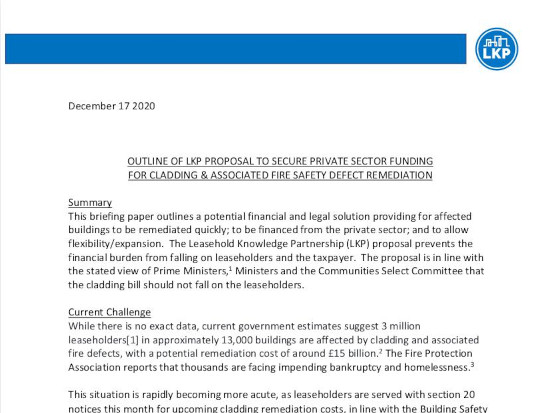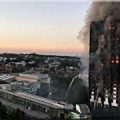
This week LKP submitted to Housing Minister Lord Greenhalgh a financial proposal (attached) outlining how to fund the remediation works for cladding and related fire safety defects.
It offers a financial solution that doesn’t involve either a huge taxpayer bailout or for leaseholders being penalised simply for being the unwitting purchasers of flawed products.
The LKP proposal funds the remediation works without requiring the government to provide upfront funding beyond the existing Building Safety Fund. Instead, it is financed entirely by the private sector.
The proposal has been authored by Dean Buckner, former Bank of England economist and a trustee of the Leasehold Knowledge Partnership. He has been assisted by legal and City professionals.
The proposal suggests the issuance of a 50-year bond at a rate of approximately 0.6% (very attractive to the fixed income market). The bond would be repaid by a system of levies of the housing sector – potentially a cladding manufacturer levy, a ground rent levy, a developer levy and a non-domiciled residential property tax.
The proposal also recommends that the cladding remediation and associated works be VAT zero-rated.
Dr Buckner outlined a draft of the proposal to the All Party Parliamentary Group on leasehold and commonhold on December 10. It can be viewed here:
https://www.leaseholdknowledge.com/full-appg-december-10-can-be-seen-here/
The APPG was also addressed by Michael Wade, the former insurance sector businessman, who is advising government on financial solutions to the cladding scandal.
At present, the re-sale market in flats in the UK is stalled, and 10,000s of leaseholders face financial ruin owing to the cladding remediation costs and associated expenses such as waking watch costs and vastly increased building insurance premiums.
The LKP cladding levy proposal can be read and downloaded here:
 Loading…
Loading…





 Government steps back from dumping all cladding costs on leaseholders
Government steps back from dumping all cladding costs on leaseholders






















Your article states:-
Current government estimates suggest 3 million leaseholds in approximately 13,000 buildings are affected by cladding and associated fire defects.
The House of Commons Library states: –
The Ministry for Housing, Communities and Local Government (MHCLG) estimates that there are around 4.3 million leasehold homes in England, of which 69% are flats and 31% are houses.
I think you have made a mistake: – The MHCLG estimates that there are around 3 million flats in England i.e., 69% of 4.3 million leasehold homes and it is therefore a proportion of those 3 million flats that have cladding issues not all of them.
Why is not the focus of the attempt to raise the money not directed at the manufacturers of the cladding and the Government agency that approved the material. The developer would have relied on the specification from the manufacturer and the certification given to the product.
The MHCLG figure is probably an under estimate and not correct, 6 million nearer the mark. A few years ago they were saying there were only 1.5 million leasehold properties !
How do you arrive at your figure?
Six years ago I bought the freehold to a block of 20 flats of which I own two in the block. This came about because non of the other Leaseholders wanted to contribute to a right of enfranchisement and I didn’t want the freehold to be sold to a 3rd party for obvious reasons. I do not charge for subletting, deeds of covenant or anything else.Why should I now be asked to pay for the cladding on the building, ridiculous. It is the architects who are to blame for the cladding, it was the trend. Every city you visit, you see all sorts of different cladding. Most of this cladding is not ACM and so every building should be judged on it’s own merit of fire safety and not the blanket cover that this has been given. Leaseholders are trapped through no fault of their own and most are living in perfectly safe buildings . Let’s get this sorted, and quick!!